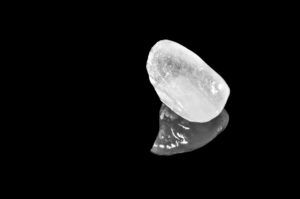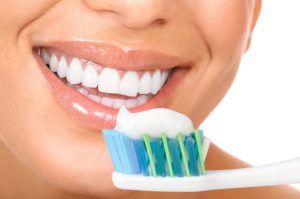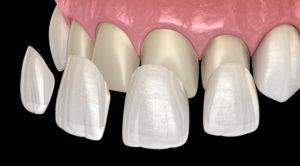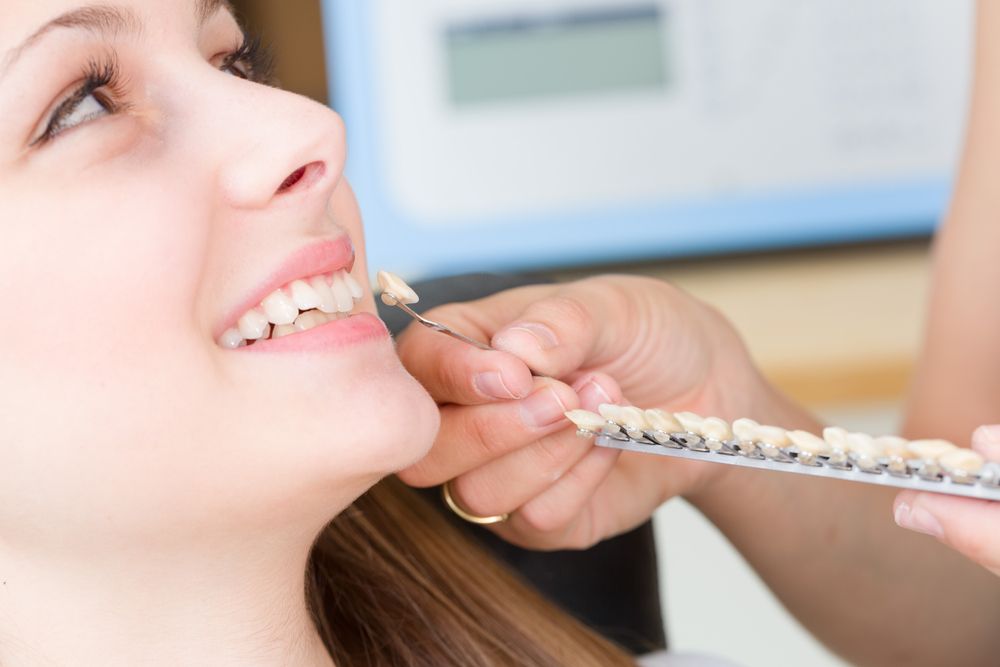Dental veneers, also known as laminates, are thin shells of porcelain or dental composite that are adhered to the teeth in order to improve their color and shape. They are often used to create an overall more aesthetic appearance by correcting certain dental issues. Because they are used primarily for aesthetics, veneers are generally only applied to teeth that are visible when smiling or speaking.
Did You Know?
Although dental crowns and veneers are both common restoration options, dental veneers are less invasive than traditional dental crowns. While a dental crown covers and encases the entire tooth, dental veneers only cover the front surface of the tooth. Because of this, dental veneers require less altering of the tooth’s natural structure during the preparation process.
Frequently Asked Questions:
Are veneers right for me?
Veneers may be the right dental treatment for you if you are looking for a way to improve the aesthetics of your smile. Veneers are ideal for patients who have severely stained or discolored teeth, crooked teeth, misshapen or unevenly sized teeth, or for those who have unsightly gaps between their teeth. Veneers can also be used on small teeth and large teeth to correct their size. To find out if dental veneers are the best treatment option for you, schedule a consultation with Dr. Pushpa Sachdeva of Ace Dental Care today.
What are veneers made of?

Veneers are thin shells made of porcelain or composite resin. Dental composite veneers are much more affordable, however have a shorter lifespan. Porcelain veneers can be more expensive, however they last longer and provide a more natural appearance. Porcelain veneers are also highly stain resistant. For these reasons, many dentists strongly recommend porcelain veneers over dental composite veneers.
Are there different types of veneers?
Yes, there are traditional and no-prep veneers. Traditional veneers refer to veneers that can only be placed by removing a small amount of tooth enamel. No-prep veneers are those that can be placed without needing to remove tooth enamel. Both types of veneers can offer different types of benefits and drawbacks.
What are the pros and cons of veneers?
Dental veneers offer many benefits, however dental veneers can also have problems. Listed below are a few pros and cons of veneers to give you a brief comparison.
Pros of dental veneers:
- More conservative than other cosmetic dental procedures
- Can correct a variety of dental concerns
- Can be customized to have a natural appearance
- Porcelain is compatible with gum tissue
Cons of dental veneers:
- Irreversible
- If the veneers become damaged, they must be replaced
- Not ideal for decayed teeth or for those with gum disease
- Can cause tooth sensitivity
How long do dental veneers last?
Veneers can last anywhere from 5-15 years, depending on the type, material, and how well you take care of them. Porcelain veneers have the longest lifespan of about 10-15 years, while composite and no-prep veneers tend to last about 5-7 years.
How do I care for my veneers?

You will need to care for your dental veneers much like you would care for your natural teeth. Proper care for your teeth means a good oral hygiene routine of brushing twice a day with fluoridated toothpaste and flossing once a day. Additionally, you will want to visit Ace Dental Care at least once every six months for your dental checkups and professional teeth cleaning. Even though veneers are mostly stain resistant, strongly pigmented substances such as red wine can cause them to stain. For this reason, it is important to regularly have your veneers cleaned with your natural teeth. Regular teeth cleanings are also essential to remove harmful bacteria, prevent tooth decay, and maintain good oral health.
Additionally, you will want to prevent damaging or wearing out your veneers. This means that you will want to avoid any damaging behaviors such as chewing ice, biting your nails, smoking, using your teeth to open packages, or teeth grinding and clenching. You are also advised to only chew using your back teeth to prevent damage to the veneers on your front teeth. In the case that you play sports or grind your teeth, you are encouraged to wear a protective mouth guard to protect both your veneers and your mouth in general.
How are veneers placed?

Veneers are generally placed over a span of two dental appointments. The first appointment consists of preparing your teeth for the veneers, while the second appointment places the permanent veneers. To prepare your teeth for veneer placement, an extremely thin layer of enamel is removed and reshaped. The modification of your natural tooth structure is a necessity to ensure there is ample space to accommodate the veneer.
Once your teeth have been properly reduced and reshaped, a dental impression will be taken of your mouth by having you bite down into a metal or plastic tray. This tray is filled with a soft putty that will eventually harden into a rubber-like consistency over the course of a minute. The trays will then be removed from your mouth and sent to a dental laboratory. The dental laboratory will use the dental impression to custom fabricate veneers especially for your mouth. In the meantime, you may be fit with temporary veneers until your permanent ones can be placed.
At your second appointment, the veneers will be placed on your teeth. However, before placing the veneers, Dr. Sachdeva will thoroughly clean your teeth to remove any bacteria and allow for an even application. After your teeth have been cleaned, a special adhesive will be applied and the veneers will be placed over this adhesive. A special curing light will then be used to harden the adhesive and stabilize the veneers.
Will I need to follow any post-treatment instructions?
With dental veneers, you will not have to follow any post-treatment instructions beyond waiting until the anesthetic wears off to eat. Once the anesthetic wears off, you can return to your usual routine with no dietary or activity restrictions. You can also immediately to your usual brushing and flossing routine.
After your veneers are placed, you may notice that your teeth feel sensitive to hot and cold temperatures, or sugary foods. This is called tooth sensitivity and it is to be expected for about the first week or so after having veneers placed. This is because a small part of your enamel was removed and your teeth need to adjust.
Some people may also notice that their veneers feel rough. Usually, this is simply the result of excess adhesive and it usually resolves itself with eating and brushing. If you still notice the roughness after a week, Dr. Sachdeva can remove or file down the rough spots.
What do veneers cost?
The cost of your veneers will depend upon the type and material used. No-prep and composite veneers are generally more affordable upfront, however they only have about half the lifespan as traditional veneers. In the long run, traditional veneers tend to be more economical even though they have a higher upfront cost. For more information on the cost of veneers, speak with Dr. Sachdeva.
Dr. Pushpa Sachdeva has been providing some of the best dental care in Nairobi for over 33 years. For comprehensive, family-friendly dental care for all ages, schedule a consultation at Ace Dental Care today!




